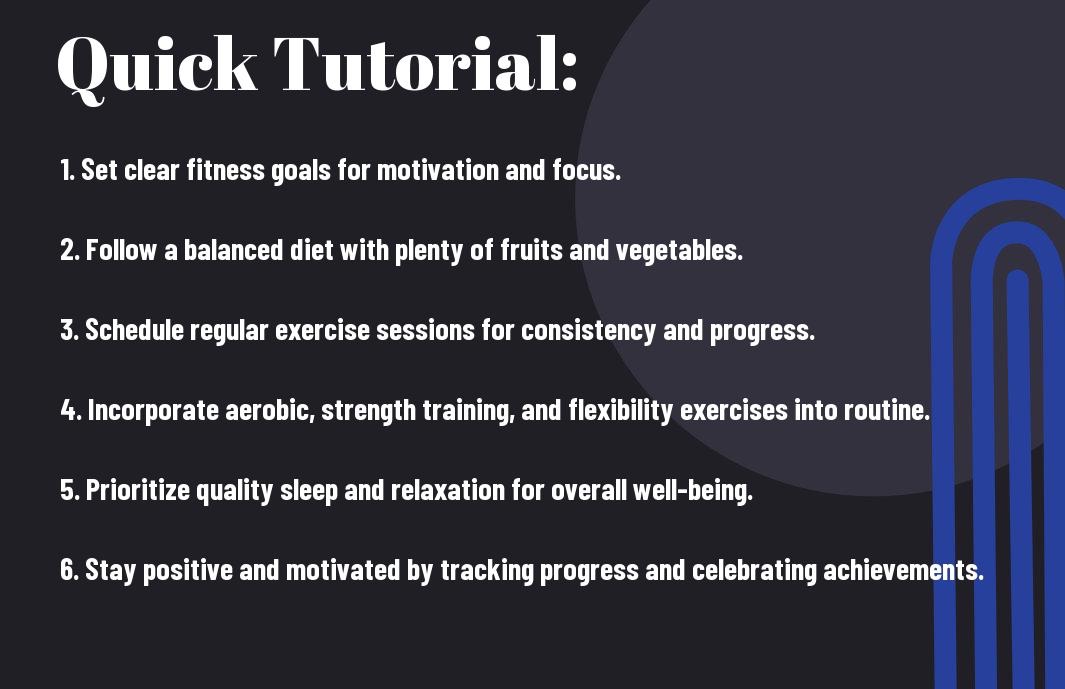Embarking on a journey to achieve optimal mental and physical fitness requires dedication, commitment, and a strategic plan in place. In this tutorial blog post, we will explore key steps to help you improve your overall well-being. From adopting a balanced diet and establishing a consistent workout routine to practicing mindfulness and stress management techniques, we will delve into crucial aspects that can positively impact your health. Stay tuned to discover actionable tips and essential advice on enhancing your mind and body.
Key Fitness Takeaways:
- Consistency is key: Regular physical exercise and mental workouts are essential for maintaining overall health and fitness.
- Balance is crucial: Maintaining a balance between psychological and physical activities to achieve optimal fitness levels is important.
- Proper nutrition is essential: Eating a well-balanced diet plays a significant role in staying mentally and physically fit.
- Stay hydrated: Drinking an adequate amount of water is necessary for both mental and physical health.
- Set realistic goals: Establish achievable fitness goals to keep yourself motivated and track your progress.
- Listen to your body: Pay attention to your body’s signals and avoid overexertion to prevent injury and burnout.
- Seek professional guidance: Consulting with a fitness trainer or mental health professional can provide personalized guidance and support on your fitness journey.

Building the Foundation for Fitness
Building a solid foundation for fitness is one key component of achieving overall health and well-being. This involves setting realistic goals, cultivating the right mindset, and staying committed to the journey towards better physical and mental health.
Setting Realistic Goals
Fitness goals should be attainable and measurable. Setting realistic goals helps you stay motivated and track your progress effectively. Start by identifying specific objectives such as losing weight, improving flexibility, or increasing muscle strength. Break down your goals into smaller milestones and celebrate each achievement. Remember, progress takes time, and consistency is critical.
The Role of Mindset in Fitness
Goals are essential in fitness, but mindset plays an equally important role in your success. Cultivating a positive and determined mindset will help you overcome obstacles and stay focused on your fitness journey. Your mindset shapes your actions and behaviors, so it’s crucial to maintain a can-do attitude and remain resilient in the face of challenges. Visualizing your success, practicing gratitude, and surrounding yourself with supportive individuals can all contribute to a solid and resilient mindset.
Mindset is a powerful tool for achieving fitness goals. By harnessing the power of positivity, determination, and resilience, you can navigate through setbacks and obstacles with grace and determination. Your mindset can either fuel your progress or hinder your success, so it’s essential to cultivate a solid and unwavering belief in your ability to achieve your fitness goals. Remember, a positive mindset can propel you towards more significant physical and mental well-being.

Physical Fitness Strategies
Creating a Balanced Exercise Routine
Routine physical activity is essential for improving and maintaining your physical fitness. Creating a balanced exercise routine, including a mix of cardiovascular exercises, strength training, and flexibility exercises, is important. Cardiovascular exercises such as running, cycling or swimming help improve your heart health and stamina. Strength training exercises such as weightlifting or bodyweight exercises help build muscle mass and increase metabolism. Flexibility exercises such as yoga or stretching improve your range of motion and reduce the risk of injuries.
Aim for at least 150 minutes of moderate-intensity weekly exercise spread over several days. It is essential to listen to your body and adjust your routine to prevent boredom or overuse injuries. Remember, consistency is vital to seeing results from your exercise routine.
Nutrition for Physical Health
Health and physical fitness go hand in hand, and proper nutrition is crucial in fueling your body for exercise and recovery. A balanced diet rich in fruits, vegetables, whole grains, lean proteins, and healthy fats is essential for supporting your fitness goals. Avoid processed foods, sugary beverages, and excessive amounts of saturated fats that can negatively impact your health and performance.
Creating a meal plan and prepping healthy snacks can help you stay on track with your nutrition goals. Remember to keep hydrated by drinking plenty of water throughout the day, especially before and after workouts. Your body is a temple, so fuel it with the nutrients it needs to perform at its best.
Mental Fitness Techniques
Stress Management Practices
Despite our best efforts, stress is a common occurrence in our daily lives. In order to maintain our mental well-being, it is essential to incorporate effective stress management practices. One technique is mindfulness meditation, which involves focusing on the present moment without judgment. This practice can help reduce anxiety and enhance our ability to handle stressful situations with greater clarity.
Mental fitness also involves regular exercise and sufficient rest. Physical activity, such as yoga or hiking, can help release tension and improve our mood. Moreover, ensuring we get an adequate amount of sleep each night is crucial for managing stress levels and maintaining overall mental health.
Building Mental Resilience
Mental resilience is the ability to bounce back from adversity and challenges. Building mental resilience involves cultivating a growth mindset, where setbacks are viewed as opportunities for learning and growth. Practicing gratitude and self-compassion can also enhance our resilience by fostering a positive outlook even in difficult circumstances.
The journey towards building mental resilience may require seeking support from a therapist or counselor to develop healthy coping mechanisms. It is important to remember that setbacks are a natural part of life, and resilience is a skill that can be developed and strengthened over time with practice and dedication.
Integrating Mental and Physical Fitness into Lifestyle
After setting your goals for mental and physical fitness, the next step is to integrate them into your daily lifestyle. This process involves establishing daily routines for success and understanding the importance of consistency and accountability.
Establishing Daily Routines for Success
Routines are the foundation of a healthy lifestyle. By creating daily rituals that prioritize both mental and physical well-being, you can set yourself up for success. Start your day with a morning workout or meditation session to kickstart your energy levels and focus. Incorporate nutritious meals and hydration throughout the day to fuel your body and mind. Implementing regular exercise, whether it’s a gym session or a walk in nature, can help reduce stress and improve overall well-being. Wind down in the evening with a relaxing activity like reading or journaling to promote better sleep quality.
The Importance of Consistency and Accountability
Physical fitness is not achieved overnight; it requires consistent effort and dedication. Setting specific, achievable goals and tracking your progress can help you stay on course. Find a workout buddy or join a fitness community to hold yourself accountable and stay motivated. Consistency is key to seeing results, so make sure to stick to your routine even on days when you may not feel like it. Remember, progress is a journey, and every small step counts towards your ultimate success.
Mental fitness, just like physical fitness, relies on consistency and accountability. Building a routine that includes mindfulness practices, such as meditation or deep breathing exercises, can help improve focus and reduce stress. Additionally, seeking support from a therapist or counselor can provide guidance and accountability in your mental health journey. Remember, taking care of your mental well-being is just as important as taking care of your physical health for overall wellness.

Measuring Your Progress
Keep track of your journey towards mental and physical fitness by measuring your progress regularly. This will help you stay motivated and make necessary adjustments to your routine for better results.
Tracking Physical Improvements
Physical improvements can be measured through various metrics such as weight, body measurements, and physical strength. Keep a record of these measurements and compare them over time to see how your body is progressing. By tracking these improvements, you can set new fitness goals and push yourself to achieve more.
Regularly monitoring your physical improvements can also help you identify any areas that may need more focus in your workout routine. Whether it’s improving your cardiovascular endurance or increasing your muscle mass, tracking your progress will give you a clear picture of how your body is responding to your fitness regimen.
Assessing Mental Well-being
Assessing your mental well-being is equally important in your journey towards overall fitness. Keep a journal to jot down your thoughts and emotions regularly. Pay attention to any patterns or changes in your mood and mental health, as they can be indicators of your overall well-being.
For instance, if you notice that you feel more anxious and stressed on days when you skip your workout, it could be a sign that exercise plays a crucial role in managing your mental health. Use this information to prioritize self-care activities that positively impact your mental well-being, such as meditation or spending time in nature.
Overcoming Obstacles and Staying Motivated
Unlike physical fitness, where progress can be easily measured in terms of strength gained or weight lost, mental and emotional fitness can often present more intangible challenges. It’s essential to recognize that setbacks and plateaus are a natural part of the journey towards overall well-being.
Dealing With Plateaus and Setbacks
With healthy living, it’s common to reach a point where progress seems to come to a standstill. This is known as a plateau, and it can be frustrating. During these times, it’s crucial to reassess your goals and strategies. Perhaps it’s time to switch up your routine, set new challenges, or seek guidance from a professional. Setbacks, on the other hand, are temporary hurdles that test our resilience and determination. Embrace them as opportunities for growth and learning, rather than seeing them as failures.
Finding Support and Community
With mental and physical fitness, having a support system and a sense of community can make all the difference in staying motivated and overcoming obstacles. Whether it’s joining a fitness class, finding an online forum, or simply confiding in a close friend, having people to share your journey with can provide encouragement and accountability. Surrounding yourself with individuals who are also committed to self-improvement can help you stay focused and motivated.
Obstacles are a natural part of any pursuit towards mental and physical wellness. It’s essential to recognize them for what they are – temporary challenges that can be overcome with perseverance and dedication. By finding the right support system and a sense of community, you’ll be better equipped to navigate through the tough times and emerge stronger on the other side.
Final Thoughts
The key to achieving mental and physical fitness lies in a balanced approach that includes regular exercise, proper nutrition, adequate rest, and stress management techniques. By incorporating a variety of activities into your routine and listening to your body’s needs, you can work towards improving your overall well-being. Remember to always consult with a healthcare professional before beginning any new fitness regimen to ensure it is safe and suitable for your individual needs. Stay committed, stay focused, and watch as your mental and physical strength grow with each step you take towards a healthier lifestyle.
FAQ
Q: Why is it essential to be mentally and physically fit?
A: Being mentally and physically fit is important for overall well-being and quality of life. It helps improve mood, increase energy levels, boost self-esteem, and reduce the risk of chronic diseases.
Q: What are some mental exercises to improve mental fitness?
A: Some mental exercises to improve mental fitness include mindfulness meditation, puzzles and brain games, reading, learning a new skill or language, and setting and achieving goals.
Q: What are some physical exercises to improve physical fitness?
A: Physical exercises to improve physical fitness include cardio such as running, swimming, or cycling; strength training with weights or bodyweight exercises; flexibility exercises like yoga or stretching; and balance exercises.
Q: How often should I exercise to improve my overall fitness?
A: It is recommended to engage in at least 150 minutes of moderate-intensity aerobic activity or 75 minutes of vigorous-intensity aerobic activity per week, along with muscle-strengthening activities on 2 or more days a week.
Q: What role does nutrition play in getting mentally and physically fit?
A: Nutrition is crucial in getting mentally and physically fit by providing the necessary nutrients for energy, recovery, and overall health. A balanced diet rich in fruits, vegetables, lean proteins, whole grains, and healthy fats is essential.
Q: How important is rest and recovery in achieving fitness goals?
A: Rest and recovery are equally important as exercise in achieving fitness goals. It allows the body to repair and strengthen itself, prevents injuries, and improves performance. Aim for 7-9 hours of quality sleep each night.
Q: What are some tips for staying motivated on the fitness journey?
A: Some tips for staying motivated on the fitness journey include setting specific, achievable goals, finding a workout buddy or joining a fitness community, tracking progress, rewarding yourself for milestones, trying new activities, and focusing on the benefits of being mentally and physically fit.






The pursuit of mental and physical fitness, a wonderful endeavor indeed! To achieve mental and physical fitness, it’s important to adopt a holistic approach that encompasses various aspects of well-being. Here are a few suggestions to help you on your journey:
Remember, my dear friend, that everyone’s journey to mental and physical fitness is unique. It’s important to listen to your body and find what works best for you. Stay consistent, be patient with yourself, and celebrate the progress you make along the way.
Hmm, I hope these suggestions provide some guidance on your path to mental and physical fitness. If you have any specific questions or need further assistance, feel free to ask!